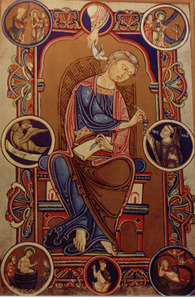
The Apostle John, whom Jesus loved, was a son of Zebedee, and the brother of that James the Apostle who was beheaded by Herod soon after our Lord suffered. He was the last of the Evangelists to write his Gospel, which he published at the request of the Bishops of Asia against Cerinthus and other heretics, and particularly against the then spreading doctrine of the Ebionites, who asserted that Christ had had no existence before Mary. It was therefore needful for the Evangelist to declare his eternal and divine generation.
In the fourteenth year of Domitian, whilst this same was stirring up the second persecution after that of Nero, John was exiled to the Island of Patmos where he wrote his Apocalypse, whereon commentaries have been composed by Justin Martyr and Irenaeus. When Domitian was killed, the Senate annulled all his acts on account of their excessive severity, and the Apostle returned to Ephesus during the reign of Nerva. There he remained until the time of Trajan, and founded and governed all the churches of Asia. There also in an extreme old age, he died, in the sixty-eighth year after the Lord's passion, and was buried near the same city of Ephesus.
At that time: Jesus saith unto Peter: Follow me. Then Peter, turning about, seeth the disciple whom Jesus loved following.
Sermon by St. Augustine the Bishop
The Church knoweth of two different lives which God hath revealed and blessed. One is the life of faith, the other the life of knowledge. One is the life of this pilgrimage, the other the life of the eternal mansions. One is the life of labour, the other the life of rest. In one we are on the journey, in the other we are in our own home. One continueth the toil of action, the other continueth in the recompense of contemplation. The one escheweth evil and doeth good; the other hath no evil to eschew, but rather an exceeding good to enjoy. The one striveth with the enemy, the other hath no enemies, and reigneth.
The one succoureth the needy; the other is where there be none to succour. The one must needs forgive trespasses that its own may be forgiven; the other neither hath trespasses to forgive nor to be forgiven. The one is straitened by adversity lest it be swollen in the pride of its good things; the other is enlarged by grace so that it may embrace the Highest Good, wherein it hath no temptation to pride.
Wherefore the one is good but still sorrowful; the other is better and blissful. And of these two lives there are types, of the one in the Apostle Peter, of the other in the Apostle John. The one laboureth here even unto the end, and findeth its end hereafter. The other stretcheth out into the hereafter, and in eternity findeth no end. Wherefore is it said unto the one: Follow me. But of the other: If I will that he tarry till I come, what is that to thee? follow thou me. What is the meaning of these words? Who can know? As far as I can understand them, it is this: Follow thou me, O Peter, by the imitation of my example in the bearing of earthly sorrow; do thou, O John, tarry patiently till I come for thee again, bringing the everlasting reward.




